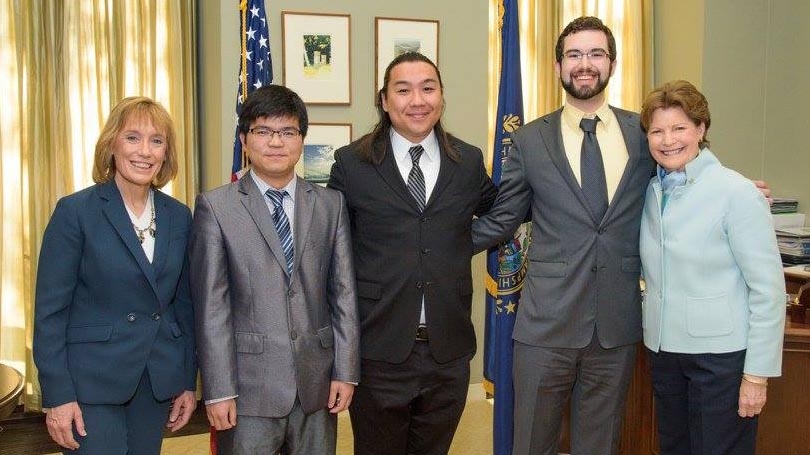
STEPS representatives (L-R: Huanping Huang, Shan Chen and Nicholas Warren) and Senators Maggie Hassan (L) and Jeanne Shaheen (R) met during the Congressional Visit Day.
The graduate student organization Science, Technology, and Engineering Policy Society (STEPS) sent a delegation of three graduate students to Washington D.C. the first week of April. Their goals: to advocate for robust federal investments in scientific research and to encourage the use of science in the policy making process. STEPS coordinated with similar science policy groups, organized by the National Science Policy Group (NSPG), from across the country to maximize their impact by converging on Capitol Hill on the same day. This was the fourth annual Congressional Visit Day organized by NSPG.
The three STEPS members, Nicholas Warren, Shan Chen, and Huanping Huang, coordinated meetings with the New Hampshire delegation, as well as Senators from their home states of Minnesota and Oklahoma. The vast majority of congressional office visits do not include the representatives themselves. Usually, a legislative aide who covers the topic of interest is the primary contact person, but that doesn’t make the meeting any less important: representatives rely heavily on the input of their staffers when considering legislation and are able to have far more in-depth conversations on their areas of expertise. The type of staffer can also vary greatly. STEPS met with some aides who have PhDs in science as well as freshly graduated political science majors. Meetings with staffers that lack a background in hard sciences can be quite stimulating; they provide an opportunity to teach about how the world of science operates.
A major focus of the office visits were the President’s proposed cuts to federal agencies that provide essential funds for scientific research, including at Dartmouth. Approximately $7 billion is proposed to be cut from the National Institute of Health alone over the next 18 months, in addition to significant cuts at other agencies. Nick, Shan, and Huanping felt it was important that Congress heard how these cuts would affect research at Dartmouth and institutions across the country. Fortunately, the offices they visited from both sides of the aisle, were enthusiastic about maintaining or increasing funding for science. According to their visits, it is likely that Congress will make significant changes to the President’s proposed budget that will be more beneficial for the scientific enterprise. A majority in both houses of Congress and the President must agree on a budget before it becomes law. There are two budgetary deadlines coming up this year. A “Continuing Resolution” to fund the government through October of this year is due by April 28th and the 2018 fiscal year budget is due in October. If a budget fails to pass by the deadline, the government will shutdown until a deal is reached.
NSPG also organized a day of science communication training for the participating graduate students. The keynote presenter was Lynn Marquis, from the Life Sciences Coalition. Lynn spent many years working in congressional offices and shared her valuable experience of communicating to policy makers. Her advice consisted of 5 main points:
You can also make your voice heard without going to Washington D.C. Representatives frequently hold town halls back home, which are great opportunities to see them in person. Other options include calling or emailing their offices. Staffers read or listen to every single email and phone call and compile that information on a regular basis into a report to the representative. You can find the contact information for your representatives on either www.house.gov or www.senate.gov
Funding for the STEPS Congressional Visit Day was generously provided by the School of Graduate and Advanced Studies’ Professional Development Fund. Nick, Shan, and Huanping will be sharing their experiences from the Congressional Visit day at the next STEPS lunch meeting on Tuesday, April 11th at 1pm in Haldeman 124. Anybody interested in learning more about their visit is welcome! Please RSVP to STEPS@Dartmouth.edu